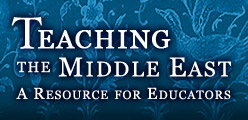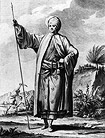The Eighteenth and Nineteenth Centuries CE
In the late eighteenth and early nineteenth centuries, there were profound changes in the relationships between western Europe and the Middle East.
One development that stimulated these changes was the intellectual program of the Enlightenment—seen by some as a rebirth of Aristotelian philosophy in its broadest sense. Enlightenment thinkers who influenced the policies of European rulers gave systematic attention to natural history, natural science, and cultural history as aspects of a single way of examining the world. New developments in stratigraphic geology, astronomy, and ancient history were all ways of explaining the known world with reference to causes in a remote past. Now, European travelers in the non-European world became not just observers, but explorers, collecting flora, fauna, minerals, and geographic and meteorological information, but also information on cultural history, present, past, and ancient.
A second development made it possible for more and more such explorers to report their findings. European nation-states began to compete for economic and political involvement in large parts of the world, leading eventually to the era of the worldwide European empires. The intellectual programs of the Enlightenment shaped parts of the competition. The people and institutions that extended Western political and economic dominance sometimes saw their work as a progressive mission, impelled by the liberal rationalism of the Enlightenment. They sometimes made explicit comparisons between themselves and the corps of discovery that accompanied Alexander’s conquering armies and the libraries and museums of the Hellenistic capitals that accumulated the world’s ancient knowledge.
Conclusion
By the turn of the twentieth century, the western world was well advanced in recovering a long-lost awareness of Near Eastern antiquity. As Berossus and Manetho had explained Mesopotamia and Egypt to intrusive Hellenistic dynasts, now explorers, archaeologists, and philologists explained them to intruding European powers.
Unlike Berossus and Manetho, however, these modern researchers did not belong to the indigenous societies, but were intruders themselves, however sympathetic. And now they presented their rich, seemingly inexhaustible results not just as the antiquity of Egypt or Iraq or Syria or Palestine, but as the background of the Bible and the ancestry of Greece and Rome, the first steps of civilization itself. The antiquity of the Near East was now researched and interpreted, without a trace of irony, as the antiquity of the West.

 Matthew W. Stolper
Matthew W. Stolper
Professor of Assyriology and the John A. Wilson Professor of Oriental Studies
Guiding Questions
1. The ability or knowledge to translate the original ancient texts of the Near Eastern civilizations was lost. The author overtly states and later implies that this lost ability forced scholars to rely upon “shadows” of the full detail of Near East history. What are the potential costs, both obvious and subtle, of relying upon these “shadows” of history?
2. In the last three lines of the module essay’s conclusion the author inserts a parenthetical editorial. In the author’s opinion, why, or how, can the West’s claiming inheritance of Near East antiquity be considered “ironic?” Provide one example from each section of the module essay.


 Print Page
Print Page


